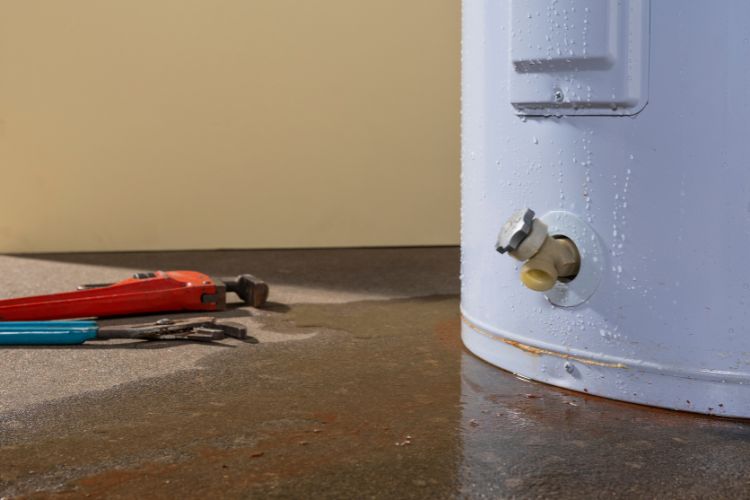CALL US: (405) 777-4495
Address: 3104 S Kelly, Edmond, OK 73013
Email: office@edmondair.com
WHY YOUR WATER HEATER LEAKS OR RUPTURES

Water heater failure can lead to significant damage to your home. Water heaters have a lifespan of 10-20 years, but without proper maintenance that span is greatly reduced.
According to an IBHS study, 69% of all water heater failures result from a slow leak or a sudden burst. A residential water heater holds 20 to 80 gallons of water, so as you can imagine it could cause significant water damage to your home upon failure. On average, residential water heaters cost only $1,500 to replace, but a leaking or burst water heater typically adds over $3,000 in additional property damage.
There are several possible reasons for a water heater to leak:
Internal rust/corrosion : The most common reason due to lack of routine maintenance. You can prolong the life of a water heater by periodically checking the water heater for any signs of rust and performing preventative maintenance. The two primary causes of tank rust or corrosion are failing to replace the sacrificial anode and allowing scale to build up.
Traditional, tank-style water heaters are installed with at least one sacrificial anode rod, whose sole purpose is to attract corrosive elements in the water and prevent the tank’s steel lining from deteriorating. Some larger residential tanks can contain two rods, while commercial tanks may contain up to five.
These anode rods are composed of magnesium, aluminum or an aluminum-zinc alloy with a steel core wire. Because the rods attract these corrosive elements, they must be monitored for corrosion. If not replaced in time, the water’s corrosive elements will begin to attack the steel lining of the tank. The water heater’s anode rod(s) should be replaced every five years to prevent steel liner corrosion.
Scale Buildup : When hard water is heated, it creates a calcium carbonate deposit known as “scale.” Over time, these scale deposits build up on the bottom of the tank and create an insulating effect, leading the tank to overheat, which in turn slowly melts the tank’s protective glass lining. Once this lining has melted away, the exposed steel begins to corrode and weaken, eventually leading to the tank leaking at the bottom. In some extreme cases, scale build-up can cause the entire bottom of the tank to disintegrate.There are two ways to avoid this scale build-up effect. Flush the tank periodically to remove scale particles and prevent buildup and/or install a water softener.
Pressure Buildup : If the pressure inside of the water heater becomes too great, it can cause the tank to leak or even burst. Some of the most common causes for increased pressure include elevated water temperatures, excessive exterior water supply pressure, and relief valve or thermal expansion tank failure.
Elevated water temperature : When energy (in the form of heat) is applied to water, its particles move faster and occupy more space, a concept known as thermal expansion. Because of this phenomenon, water at 145 degrees occupies more space than the same volume of water at 125 degrees, and the water pressure increases proportionately.This expansion can be regulated using an external thermal expansion tank to allow excess water to escape from and reduce the pressure inside of the tank.
Relief valve and/ or thermal expansion tank failure : Thermal expansion tanks and pressure/temperature relief valves provide valuable failsafes when the pressure in the tank is too high. If they fail to function properly, the tank can burst. The valves can fail overtime and the expansion tanks are subject to cracking
DELIVERING QUALITY SERVICE AT AFFORDABLE PRICES

Edmond Air Conditioning, Heating, and Plumbing
3104 S Kelly, Edmond, OK 73013
405-777-4495
Fax: (405) 348-4331
Email: office@edmondair.com